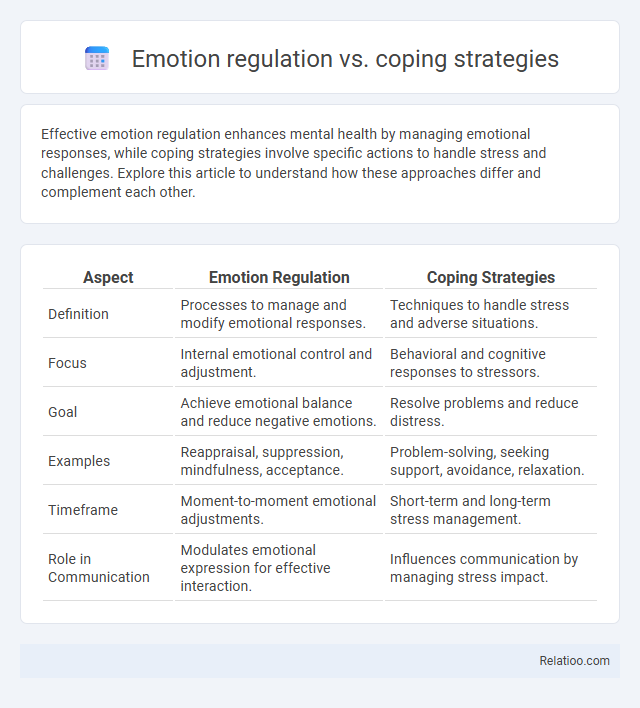Effective emotion regulation enhances mental health by managing emotional responses, while coping strategies involve specific actions to handle stress and challenges. Explore this article to understand how these approaches differ and complement each other.
Table of Comparison
| Aspect | Emotion Regulation | Coping Strategies |
|---|---|---|
| Definition | Processes to manage and modify emotional responses. | Techniques to handle stress and adverse situations. |
| Focus | Internal emotional control and adjustment. | Behavioral and cognitive responses to stressors. |
| Goal | Achieve emotional balance and reduce negative emotions. | Resolve problems and reduce distress. |
| Examples | Reappraisal, suppression, mindfulness, acceptance. | Problem-solving, seeking support, avoidance, relaxation. |
| Timeframe | Moment-to-moment emotional adjustments. | Short-term and long-term stress management. |
| Role in Communication | Modulates emotional expression for effective interaction. | Influences communication by managing stress impact. |
Introduction to Emotion Regulation and Coping Strategies
Emotion regulation involves managing and responding to emotional experiences in a way that maintains psychological balance, while coping strategies are specific behavioral and cognitive efforts to handle stress or adversity. Both concepts play crucial roles in enhancing emotional well-being and resilience by allowing Your mind to adapt to challenges effectively. Understanding the distinction between automatic emotional regulation processes and intentional coping techniques helps optimize mental health interventions.
Defining Emotion Regulation
Emotion regulation involves the processes by which individuals influence their emotions, how they experience them, and how they express them, enabling effective management of emotional responses. It differs from coping strategies, which are broader, encompassing behavioral and cognitive efforts to manage stress and challenges. Understanding emotion regulation helps you develop targeted techniques to maintain psychological well-being and adapt to various emotional situations.
Understanding Coping Strategies
Coping strategies are specific behavioral and cognitive efforts used to manage internal and external demands perceived as stressful, differentiating them from broader emotion regulation processes aimed at modulating emotional responses. Understanding coping strategies involves identifying adaptive methods such as problem-solving and seeking social support, which effectively reduce stress, versus maladaptive approaches like avoidance or substance use that may exacerbate emotional distress. Research highlights that successful coping strategies improve psychological resilience and overall well-being by targeting stressors directly or altering emotional reactions.
Key Differences Between Emotion Regulation and Coping
Emotion regulation involves managing and altering emotional responses in real-time using strategies like mindfulness or cognitive reappraisal, whereas coping strategies refer to broader methods employed to handle stress and adversity, including problem-solving or seeking social support. Your ability to regulate emotions targets internal emotional control, while coping strategies address both emotional management and external stressors. Understanding this distinction helps tailor more effective interventions for mental well-being and resilience.
Types of Emotion Regulation Techniques
Emotion regulation involves conscious methods like cognitive reappraisal and expressive suppression to manage your emotional responses effectively, while coping strategies encompass both adaptive techniques such as problem-solving and social support, and maladaptive approaches like avoidance. Key types of emotion regulation techniques include situation selection, situation modification, attentional deployment, cognitive change, and response modulation, each targeting different stages of the emotional process. Understanding these varied techniques helps you tailor strategies to reduce emotional distress and improve psychological resilience.
Categories of Coping Strategies
Coping strategies encompass problem-focused, emotion-focused, and avoidance categories, each serving distinct roles in managing stress. Emotion regulation specifically targets modifying your emotional responses through techniques like cognitive reappraisal or suppression. Understanding these categories helps tailor effective interventions for emotional well-being and resilience.
The Role of Awareness in Managing Emotions
Emotion regulation involves the conscious monitoring and modification of emotional responses, whereas coping strategies encompass both conscious and unconscious efforts to manage stress and emotional challenges. Emotional regulation specifically emphasizes awareness of internal emotional states, enabling individuals to identify, understand, and adjust their feelings effectively. Research highlights that heightened emotional awareness serves as a critical foundation for successful emotion regulation and adaptive coping strategies, leading to improved psychological resilience and mental health outcomes.
Psychological Impacts of Emotion Regulation vs Coping
Emotion regulation involves managing your emotional responses to maintain psychological well-being, whereas coping strategies are techniques you use to handle stress and challenges. Effective emotion regulation reduces anxiety and depression by promoting adaptive responses, while coping strategies vary in impact depending on whether they are problem-focused or emotion-focused. Research shows that strong emotion regulation skills correlate with greater resilience and lower psychological distress compared to inconsistent coping methods.
Choosing the Right Approach: Factors to Consider
Choosing the right approach between emotion regulation, coping strategies, and emotional regulation depends on factors such as the nature of the stressor, individual personality traits, and the desired outcome. Emotion regulation involves managing and modifying emotional responses, while coping strategies encompass behavioral and cognitive efforts to handle stressors. Understanding the context and personal preferences helps optimize mental health interventions and resilience-building.
Integrating Emotion Regulation and Coping for Well-being
Integrating emotion regulation and coping strategies enhances well-being by addressing both automatic emotional responses and conscious management techniques. Emotion regulation involves modifying emotional intensity and duration, while coping strategies focus on cognitive and behavioral efforts to manage stressors effectively. Combining these approaches fosters resilience, reduces psychological distress, and promotes adaptive functioning in diverse life challenges.

Infographic: Emotion regulation vs Coping strategies
 relatioo.com
relatioo.com